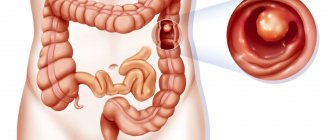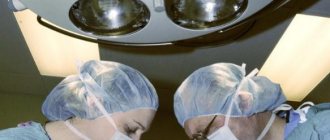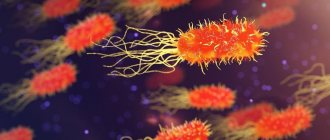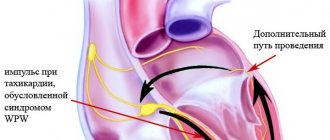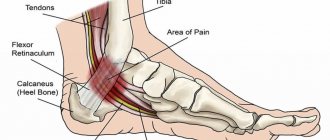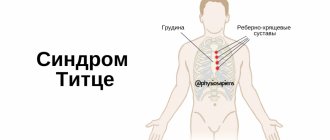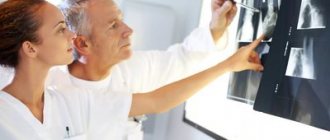What causes intestinal colitis?
The main cause of the acute condition is various pathogenic bacteria, staphylococci or streptococci. The intestinal mucosa is sensitive and can become inflamed as a result of:
- Food poisoning.
- Allergic reaction.
- The effects of certain medications.
- Severe infectious disease.
The chronic form occurs as a result of the absence or ineffective treatment of acute colitis. Most often, chronic inflammation persists due to low immunity. The pathology can be supported by the presence in the body of other pathological foci in organs adjacent to the intestines.
Other common causes of chronic colitis:
- Worm infestation.
- Diseases of the pelvic organs in women.
- Uncontrolled use of antibiotics.
- Alcoholism.
- Chronic dysbacteriosis.
- Abuse of spices and spicy foods.
- Congenital intestinal defects.
Doctors include a monotonous diet and heavy food consumption as factors that provoke the disease.
Colitis is a common occurrence in children. The reason is that the protective barrier of the outer lining of the intestine is not yet fully formed. As a result, the organ cannot cope with various pathogenic microorganisms and an inflammatory process occurs.
In adulthood, ischemic colitis can occur. They are formed due to disruption of normal blood circulation in the mesenteric arteries (the vessel through which the intestine is attached to the peritoneum). This is a dangerous condition that requires urgent medical attention.
Causes of intestinal diseases
Intestinal diseases can have a different nature: infectious, motor, immune, tumor, allergic.
Main reasons:
- Heredity. The tendency to intestinal diseases can be transmitted at the genetic level.
- Infections. Intestinal infections refer to a whole group of diseases, the most harmless of which is food poisoning. Particularly dangerous ones include cholera, typhoid fever, and salmonellosis. Intestinal infections can be bacterial or viral. From the mouth, microbes enter the stomach, and then into the intestines, where they begin to multiply intensively. After the microbes enter the body, an asymptomatic incubation period begins, which can last up to two days. Then symptoms of intestinal infection appear, caused both by the microbes themselves and the toxins they secrete. Most often, the causative agents of infectious diseases are unwashed hands, dirty dishes, raw water, poorly washed vegetables and fruits, and expired products. They occur acutely, causing inflammation of the mucous membrane and affecting the general condition of a person.
- Parasites. Their most famous “representatives” are worms. They enter the body through the oral cavity, usually through poorly processed food. For example, sushi, which is made from raw fish.
- Allergies to various foods. It appears more often in children. For example, for dairy products or citrus fruits.
- Unbalanced diet. Spicy, raw food causes enteritis and colitis. Frequent consumption of dairy products and carbohydrates (pasta, white bread) can cause constipation.
- Smoking and alcohol. They limit the supply of oxygen in the required quantity to the intestinal walls.
- Overactivity of the immune system. Sometimes, during the fight against viruses and bacteria, immune antibodies destroy not only them, but also the intestinal walls.
- Medicines. Antibiotics negatively affect the intestinal microflora, disrupting the absorption of nutrients.
- Lack of physical activity. If a person leads a sedentary lifestyle, then intestinal peristalsis (contraction of intestinal walls, which helps move food) becomes less active. Also, lack of physical activity can contribute to the appearance of hemorrhoids.
- Stress. Since the brain and gut are constantly interacting, stress can negatively affect the absorption of nutrients, and it also reduces metabolism and reduces the production of beneficial enzymes.
- Excess weight. It increases the risk of colorectal cancer (colon tumor) by 1.5 times.
- Chronic diseases (ulcerative colitis, Crohn's disease).
- Fluid deficiency. May lead to constipation.
- Damage to neighboring organs. For example, if a person is chronically ill with gastritis, the pathology can spread to the intestines, causing gastroenteritis.
- Toxic substances. The work of the mucous membrane, in particular, is disrupted by arsenic, phosphorus, and lead.
Classification of the disease
Depending on which parts of the intestine are affected by the inflammation, the following are distinguished:
- typhlitis;
- transversit;
- sigmoiditis;
- pancolitis;
- proctitis
The most common form is pancolitis. It affects the entire large intestine.
Due to their occurrence, they are distinguished:
- infectious;
- medicinal or toxic;
- ischemic - typical for patients after 55-60 years;
- radiation or radiation;
- ulcerative is the most common type.
Pathology can occur with the formation of erosions, ulcers, necrosis and hemorrhages. This is how catarrhal and erosive ulcerative colitis manifests itself.
Main signs of colitis
Symptoms vary depending on the type of disease. Acute colitis is characterized by an abrupt onset. A person complains of the following symptoms:
- diarrhea;
- widespread abdominal pain;
- vomiting;
- flatulence;
- cutting or burning pain in the rectal area;
- feverish condition.
Colitis stool usually contains blood or mucus. Due to frequent vomiting, symptoms of dehydration occur: weakness, hypotension, pale skin, thirst.
Chronic inflammation has a sluggish course. Manifestations are mild. Periods of exacerbation and calm are characteristic. The following signs may indicate the presence of inflammation in the large intestine:
- bowel dysfunction;
- aching pain, mainly in the side and lower abdomen;
- characterized by increased discomfort after eating or during active movements;
- constant bloating;
- belching;
- unpleasant taste in the mouth;
- heartburn.
A distinctive feature is that thermal procedures (heating pad, bath, mud procedures) lead to an increase in the intensity of pain. 80% of patients with this diagnosis experience a decrease in appetite.
Seven signs you have irritable bowel syndrome
Imagine the situation: there are unpleasant symptoms, but a medical examination shows that there is no problem. This is what affects the 6 to 18% of people worldwide who suffer from irritable bowel syndrome (IBS) (1).
Abdominal pain
The cause of pain in the syndrome, which is not accompanied by any significant changes in the digestive tract, is problems with the transmission of signals from the intestines to the brain and back. The coordinated functioning of the digestive tract depends on their coordination. When there is interference in the brain-gut signaling pathway, pain occurs. With IBS, it usually appears in the lower abdomen, and after bowel movement it is significantly relieved.
How to make it easier?
A diet based on limiting the consumption of certain fruits, vegetables, sweets, milk and dairy products, legumes, and flour helps reduce pain in IBS. In addition, the doctor may recommend antispasmodic drugs that specifically relieve pain in the intestines.
Diarrhea or constipation
Impaired intestinal motility that occurs with IBS leads to changes in stool, and in different directions. In approximately 1/3 of cases, the syndrome is accompanied by weakness (2), or simply diarrhea. As a rule, this increases the frequency of trips to the toilet, according to some data, at least twice as much as normal (3). Another trouble is that the urge can arise suddenly, like a bolt from the blue.
Much more often, with IBS, the intestines contract too slowly, and much more fluid is absorbed from its contents than necessary, which leads to constipation. In such cases, the frequency of bowel movements is less than three times a week. Even when a long-awaited event occurs, it often does not bring relief - IBS is characterized by a feeling of incomplete relief. Sometimes constipation alternates with diarrhea.
How to make it easier?
For diarrhea, your doctor may prescribe antidiarrheal medications. To combat constipation, it is important to drink plenty of fluids, eat foods rich in fiber, and, if the problem persists, use laxatives.
Flatulence
Due to poor digestion in IBS, too much gas is produced in the intestines. As they accumulate, they cause discomfort: many patients consider bloating to be one of the most persistent and painful symptoms of the disease. Flatulence is also becoming the most common manifestation of irritable bowel syndrome, especially in women with a predominance of constipation or a mixed type, when the latter alternates with diarrhea (3).
How to make it easier?
Diet helps reduce the severity of bloating, in particular, reducing the proportion of fruits and vegetables, legumes and other foods in the diet that stimulate gas formation in the intestines. To alleviate the condition of already existing flatulence, drugs that have a so-called carminative effect help: they reduce the surface tension of gas bubbles formed in the intestines, which leads to their rupture. The gas itself is successfully absorbed by the intestinal walls or excreted naturally.
Intolerance to certain foods
In the vast majority of cases, manifestations of IBS are associated with errors in diet. Scientists today do not know why certain foods contribute to the exacerbation of the disease. Obviously, food intolerance has nothing to do with allergies and does not, in fact, cause indigestion, but only becomes a “trigger” of the syndrome. It’s interesting that everyone has their own trigger foods, but there are also some patterns. Pastries and cakes, peas and beans, cabbage and plums, and many other gas-inducing foods that contain lactose or gluten can cause a flare-up of IBS.
How to make it easier?
The only solution to this problem is to identify trigger foods and reduce their share in the diet.
Fatigue and sleep problems
In approximately half of cases, IBS is accompanied by fatigue (4), low endurance, which limits opportunities both at work and in everyday life, and the more difficult it is to cope with stress, the more pronounced the symptoms of the disease can be. At the same time, it is not always possible to have a good rest and sleep: difficulty falling asleep and waking up is another characteristic symptom of IBS. By the way, if you spend half the night trying to sleep, it is likely that the next day the troubles will be compounded by an exacerbation of characteristic intestinal problems.
How to make it easier?
If fatigue and insomnia due to IBS are your case, most likely you will have a hard time without the help of a competent neurologist.
Anxiety and depression
It is still unclear what comes first: the symptoms of IBS, which lead to emotional distress, or, on the contrary, stress, which triggers intestinal dysfunction. However, it is clear that those who suffer from IBS are 50% more likely to have an anxiety disorder and 70% more likely to have mood disorders such as depression than those with normal bowel function (5). These are such serious numbers that every person experiencing IBS should carefully monitor their psycho-emotional state and if, for example, depressed mood, loss of self-confidence, unreasonable feelings of guilt, mood swings, or anxiety appear, immediately consult a psychiatrist.
How to make it easier?
In this situation, it is better not to rely on the help of “folk methods” for improving mood - they can only aggravate the condition. Antidepressants and anti-anxiety drugs, which should be prescribed by a doctor, can provide real help.
Sources:
- Sperber AD et al. The global prevalence of IBS in adults remains elusive due to the heterogeneity of studies: a Rome Foundation working team literature review // Gut. — 2017; 66(6):1075–1082.
- Camilleri M. Intestinal Secretory Mechanisms in Irritable Bowel Syndrome–Diarrhea // Clinical Gastroenterology and Hepatology. — 2015; 13(6):1051–1057.
- Portincasa P. et al. Pan-enteric dysmotility, impaired quality of life and alexithymia in a large group of patients meeting ROME II criteria for irritable bowel syndrome // World journal of gastroenterology. - 2003; 9 (10): 2293.
- Han CJ, Yang GS Fatigue in irritable bowel syndrome: a systematic review and meta-analysis of pooled frequency and severity of fatigue // Asian Nursing Research. - 2016; 10 (1): 1–10.
- Janssens KAM et al. Mood and anxiety disorders in chronic fatigue syndrome, fibromyalgia, and irritable bowel syndrome: results from the LifeLines cohort study // Psychosomatic medicine. — 2015; 77(4):449–457.
Marina Pozdeeva, pharmacist, medical journalist
Photo depositphotos.com The author’s opinion may not coincide with the opinion of the editors
What complications can there be?
Without appropriate and timely treatment, inflammation of the mucous membrane can lead to functional disorders. The most common are:
- the appearance of a scar, which leads to a narrowing of the lumen of the large intestine;
- internal bleeding;
- tissue necrosis, which leads to the development of peritonitis;
- non-traumatic perforation or rupture of the intestine;
- acute obstruction due to the formation of adhesions.
These conditions pose a threat to human life. It is important to consult a doctor at the first manifestations of the disease.
Diagnostics
When the first signs of a disorder appear, you should contact a highly specialized specialist - a gastroenterologist. At the first stage of diagnosis, laboratory tests are performed, gastroscopy and other endoscopic examination methods are prescribed. If the patient is prohibited from undergoing invasive diagnostics (with the penetration of endoscopic instruments), no less informative and safe MRI technology is used.
During the scanning process, a coloring agent is introduced into the intestinal cavities, which highlights the relief of the inner surface of the mucous membrane. The images show the areas where intestinal inflammation occurs. In this case, the patient does not experience pain from the procedure, since magnetic resonance imaging of internal structures takes place “remotely”. The person simply lies inside the device, and the scanners take layer-by-layer photographic images of the area being studied.
Diagnosis of pathology
Only a gastroenterologist can make the correct diagnosis. For this purpose, it is mandatory to order a scatological examination. It includes chemical, microscopic and bacteriological examination of stool in the laboratory. The Gregersen reaction test is also performed. This test aims to detect blood in the stool.
The doctor also recommends the following instrumental studies:
- X-ray of the abdominal cavity.
- Intestinal endoscopy (colonoscopy).
- Irrigoscopy - x-ray with the introduction of contrast into the colon. Allows you to accurately detect the inflammatory process and the boundaries of its spread.
It is imperative to exclude diseases such as polyposis and intestinal cancer. A warning sign is blood during and after bowel movements. This condition requires a comprehensive and thorough study. Consultation with doctors of related specialties is recommended.
Evaluation of therapy effectiveness
After therapy, re-diagnosis is required. For this, the same MRI method is used, since it is completely safe with frequent use. Scanning requires special equipment, which is not available in every public clinic. To find the nearest tomography center, use the site filters. Enter the name of the service, study the list of medical institutions, compare prices, choose the best offer and sign up for a study through the portal with a discount from the service.
How to treat intestinal colitis
During the period of exacerbation, as well as in severe cases of acute colitis, a person must be hospitalized. Treatment on an outpatient basis is carried out only after acute symptoms have resolved and there are no complications.
Therapy is aimed not only at combating inflammation, but also at reducing the sensitivity of the intestinal mucosa. At the first stage, doctors’ efforts are concentrated on eliminating signs of dehydration and normalizing the functioning of all parts of the intestines.
In chronic cases, an important treatment method is to follow a special therapeutic diet.
Diet therapy
Nutrition is adjusted at any stage of the disease. In the acute phase, it is necessary to help the intestines, so all heavy, difficult-to-digest foods are excluded from the diet. The list of prohibited products includes:
- smoked meats;
- sugar, sweets;
- meat, including broths;
- legumes;
- salt, vinegar;
- vegetables fruits;
- all products that are aimed at improving intestinal motility.
The amount of salt per day should not exceed 8-10 grams. Dishes should be served stewed, boiled or pureed. Steaming is allowed, without adding fat. Meals should be frequent, small portions. There are no restrictions on water intake.
During the period of exacerbation, the gastrointestinal tract should be spared as much as possible. To do this, you must strictly follow all the recommendations of your doctor. On average, a special diet is prescribed for 3-5 days. This is enough to relieve acute symptoms.
Conservative treatment
If therapeutic nutrition is ineffective, as well as when concomitant gastrointestinal diseases are detected, a course of antibacterial drugs is necessary.
The dose and duration of the course are selected by the doctor individually. The purpose of antibiotics is to reduce the number of pathogenic microorganisms. When dysbiosis increases, the microflora is restored with the help of probiotics and prebiotics.
If agreed with a doctor, medicinal herbal infusions can be used as an additional treatment. They help control inflammation, reduce pain and manage diarrhea.
If worms and protozoa are detected in the tests, a course of antiparasitic therapy is recommended. Sometimes it is advisable to use sorbents and intestinal antiseptics.
The inflammatory process in the lower intestines is well controlled with local anti-inflammatory treatment. For this purpose, anal suppositories and microenemas are prescribed. They help not only regulate intestinal motor function, but also have a local analgesic and bactericidal effect.
If the patient complains of constipation, laxatives, suppositories or enemas are indicated. To improve local immune forces, vitamins and immunostimulating drugs can be prescribed.
Surgical method of treatment
Surgery is recommended only in exceptional cases when there is a risk to human life. These include all complications of colitis - the development of peritonitis, intestinal rupture, internal bleeding.
Relative indications for surgical treatment may be partial intestinal obstruction or lack of positive dynamics during drug therapy.
Surgery is often performed for advanced ulcerative colitis. To do this, a coloproctectomy is performed - radical removal of the colon.
Diagnosis of intestinal diseases
To diagnose the intestines, special studies are carried out to assess its condition and structure:
- Consultation with a gastroenterologist.
At the appointment, the specialist will conduct a medical history of the patient: listen to complaints, ask about lifestyle, nutrition, and prescribe the necessary tests and studies.
- Blood analysis.
An increase in some indicators may correspond to certain intestinal ailments. For example, an increase in eosinophils is observed when infected with worms.
- Urine and stool analysis.
For example, a fecal calprotectin test can help diagnose Crohn's disease.
Instrumental methods:
- Colonoscopy.
Many people are afraid of this procedure, but today it can be performed under anesthesia without the slightest pain. In addition, colonoscopy is the most effective way to examine the colon.
- Endoscopy.
Using an endoscope, the doctor is able to assess the condition of the small intestine.
- Rectoscopy.
A painless research method that allows you to see pathologies at a depth of 25-30 cm from the anus.
- Gastroscopy (FGDS).
It is carried out using a flexible endoscope, which allows you to examine the stomach, esophagus and duodenum from the inside. It is considered one of the most effective methods for studying the gastrointestinal tract.
- Irrigoscopy using a contrast agent.
During the procedure, a contrast agent is injected into the rectum, after which an x-ray is taken. This procedure allows you to exclude the presence of tumors, perforation and stenosis of the intestinal walls.
- Rectal-digital examination.
During such an examination, the doctor can exclude or confirm such ailments as hemorrhoids, proctitis, and anal fissures.
- Computed tomography (CT) and magnetic resonance imaging (MRI).
These types of studies are used according to strict indications.
- Capsule endoscopy.
This is the latest method for studying the gastrointestinal tract. It is considered non-invasive and painless. The idea is that the patient swallows a very small capsule with a camera, and then is sent to a day hospital for observation for 8-12 hours.
call me back
Intestinal colitis: prognosis and prevention
If you seek medical help in a timely manner and follow the prescribed diet and treatment, the prognosis is favorable. After the acute period is over, performance is fully restored and well-being improves.
But to increase the duration of the remission period, a person with colitis needs to eat properly throughout his life. Long fasting or strict diets are excluded. You should forget about snacks on the run, fast food, as well as fatty, spicy and smoked foods.
It is also necessary to treat all gastrointestinal diseases in a timely manner. It is important for women to visit a gynecologist annually to identify inflammatory diseases in the pelvic organs at the initial stage.
It is recommended to undergo sanatorium-resort treatment in health institutions that specialize in gastrointestinal pathologies.
Boost your immunity and eliminate bad habits. Try to avoid prolonged stress. If you suspect you have colitis, treatment should only be prescribed by a gastroenterologist after a thorough examination.
Treatment
Treatment of colitis is aimed at eliminating the causes of inflammation. Treatment of the acute form of the disease is carried out in a hospital setting.
The treatment program may include:
- antibacterial agents;
- adsorbents for removing toxins;
- antispasmodics to reduce pain;
- enzymes (with insufficient liver function);
- antidiarrheal drugs or laxatives;
- pro- and prebiotics to normalize intestinal function.
In addition, the patient is prescribed a special strict diet and physiotherapeutic procedures.
In some cases, surgery is required. The decision to perform an operation is made by the attending physician based on the clinical picture.
